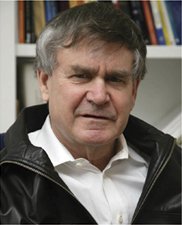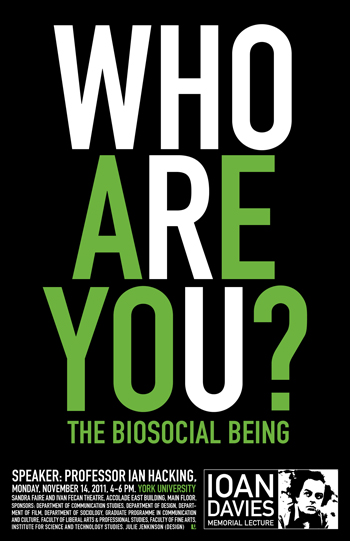Ian Hacking is University Professor Emeritus of Philosophy at the University of Toronto and served as Professor of the History and Philosophy of Science at the College de France from 2001-2006. He is the author of many significant books, including Rewriting the Soul, Mad Travelers, The Social Construction of What, and The Taming of Chance; the last was named by the Modern Library as one of the 100 best non-fiction books of the 20th Century. Professor Hacking was awarded the 2001 Canada Council for the Arts Molson Prize, the 2002 Killiam Prize for the Humanities, and the 2009 Holberg International Memorial Prize.
 Hacking was born in Vancouver, British Columbia, in 1936. He is married to Judith Baker, who teaches at Glendon College. They live in central Toronto, which, Hacking says, retains parts of its late Victorian residential core. They are proud of their small inner–city garden with its bountiful yield of heirloom tomatoes and pole beans of many varieties. Aside from the garden, their preferred relaxation is hill–walking.
Hacking was born in Vancouver, British Columbia, in 1936. He is married to Judith Baker, who teaches at Glendon College. They live in central Toronto, which, Hacking says, retains parts of its late Victorian residential core. They are proud of their small inner–city garden with its bountiful yield of heirloom tomatoes and pole beans of many varieties. Aside from the garden, their preferred relaxation is hill–walking.
While studying at Cambridge Hacking was a pupil of Casimir Lewy, and had a strict analytic training in which G. E. Moore was the role model. Lewy was Moore's literary executor (and also C. D. Broad's). Frege and Russell also figured importantly in this unusual education. Hacking says he still considers himself a Cambridge analytic philosopher, although he has branched out in many ways. In maturity Wittgenstein and Foucault are the philosophers who have most influenced the ways in which he thinks.
“I am often described as a ‘philosopher of science’. Perhaps this education explains why I do not identify myself that way. I am a philosopher, of the analytic stripe. I am unusual, in that company, for two reasons: First, because I make far more use of the past than is usual. I am engaged, some of the time, in conceptual analysis, and I believe that concepts are words in their sites, which includes past usages, and social and institutional arrangements in which words are uttered, without which we cannot understand the present. I am sometimes described as a "historian of science". I am not a historian, although I would not wholly reject the label of "historian of the present". I am an analytic philosopher who makes use of the past.
“Second, I am philosopher who thinks about the sciences in detail, which is not very common among analytic philosophers. In my opinion and practice, you can’t think about anything without ‘taking a look’. If you are interested in human knowledge, ‘its scope and limits’ as Russell put it, you have to take a look at many sciences. Russell did (for a while). In our day, when Quine’s ‘naturalized epistemology&rsqo; is rampant, I am astonished when many of my colleagues refer to ‘our best science’ (using exactly that trite phrase) as relevant to epistemology, yet do not take much of a look at any of our best sciences, which differ immensely among themselves.
“Finally, I am often described as inter-disciplinary. I contributed to a blog on that topic, with the title, "the complacent disciplinarian". That's me. As an undergraduate I acquired a discipline which made me respect most of the disciplines that we call the special sciences, but also, for instance the incredible discipline of music. Scientists are usually eager to talk about their work, but you first have to acquire a smattering of their discourse to invite them to tell you what they think they are doing. In short, I am not interdisciplinary in the sense of trying to break down disciplinary boundaries, but rather a philosopher who tries to be disciplined enough to pick up what is going on in other disciplines.
“I retired from the Collège de France at the mandatory age of 70, in 2006. So I am now Professeur honoraire, Chaire de philosophie et histoire des concepts scientifiques, and University Professor Emeritus at the University of Toronto.”

